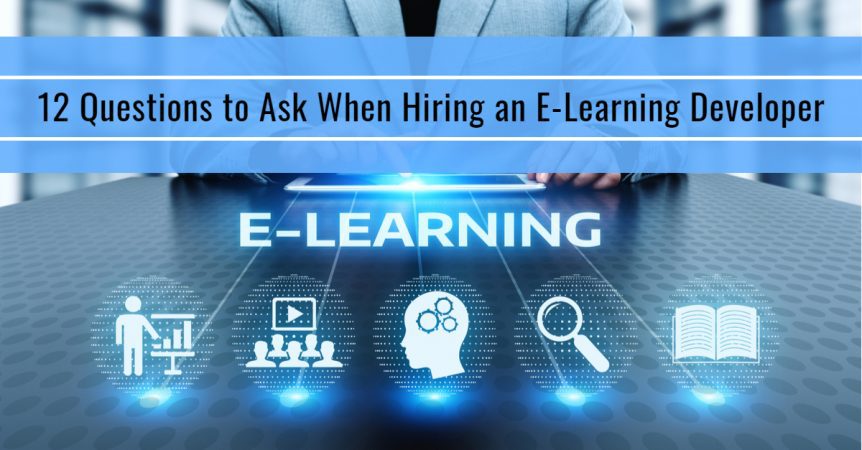12 Questions to Ask When Hiring an E-Learning Developer
If you need custom e-learning content created, hiring a professional e-learning developer is almost always the right choice. A professional e-learning developer will have the technical, design, and training skills needed to create content that will help meet your objectives.
Creating an e-learning course is a complex task, so it is important you hire the right e-learning developer, wherever you are in the UAE or Saudi Arabia. Here are 12 important questions you should ask.
- How will they measure project success?
All training content should deliver an outcome, including e-learning training content. Your business will be focused on these outcomes, so the e-learning developer you select should be too.
An experienced e-learning developer will focus on crucial success measurements from the start of the process, asking things like what success will look like for you, with examples including behavioural change, improved business metrics, etc. They might also want to know things like what is preventing this success from happening right now, and what could happen if the training doesn’t take place?
If your e-learning developer is asking questions like these, you can have confidence they are focused on the success of your business.
- How will they ensure this e-learning project aligns with other training in your organisation?
You are likely to have various training courses and materials in your organisation. This new e-learning course should be aligned with these materials, including in relation to branding, style, and tone of voice to ensure consistency (unless you want to take the training strategy in your organisation in a new direction). It is also important the new e-learning course is aligned with your learning objectives.
- What projects have they worked on previously?
Ask about projects the e-learning developer has worked on previously, particularly those that have similarities to yours. This could be similarities in terms of content, industry, or topic.
When considering these past projects, assess how they presented the information. This will give you an indication of what they will deliver for you.
- Can they help you develop a business case for the training?
If you need to create a business case for the e-learning development project, find out if the developer can help with this process. They might be able to provide insight that will help you get the project green-lighted.
- What LMS do they use, and what are the technical requirements?
Learning Management Systems are important to the success of your e-learning course for a variety of reasons. Therefore, find out what LMS they intend to use, why they use that platform, and what are the benefits to your organisation? It is also important that mobile devices are supported by all the platforms the e-learning developer uses.
- Who will take the lead in developing the e-learning course?
Companies don’t make e-learning courses – people do. So, while it is important the e-learning developer you choose has good structures and processes, and sufficient resources, it is also important to meet the people who will be responsible for the development of your e-learning course.
- Do they offer all the services you need?
Creating an e-learning course involves various tasks, including instructional design, technical development, scriptwriting, video production, animation production, graphic design, etc. You might not need all these services, but you will need many of them. It is important your e-learning developer has the full range of capabilities that you need.
- What e-learning strategies do they recommend for this project?
There is no single way of creating an e-learning course. You can structure the content in different ways and use various design techniques to facilitate the learning process. You can also design the course using a tried and tested training strategy. Examples include microlearning, blended learning, gamified learning, video-based learning, etc.
They might not be appropriate for your course, but it is worthwhile getting the perspective of the e-learning developer you are thinking of hiring.
- What is their e-learning development process?
There are lots of buzzwords used for the development process, as well as many different strategies. From your perspective, the most important thing to find out is whether the developer creates the course before sending it to you for approval, or do they use a more iterative process.
An iterative process involves using overlapping stages, where you get visibility of various sections and can approve content and milestones as you go. This is usually the best approach, although the most important thing is getting a clear understanding of how the developer plans to work. You can then decide if you are satisfied with that process.
- Are they familiar with instructional design?
Instructional design is a process that ensures e-learning courses not only look good, but also help people learn. Your e-learning developer should be familiar with instructional design, and it should be central to their process.
- How will they communicate?
Communication is crucial in an e-learning development project, from the earliest information gathering stage to requesting feedback, asking questions, and reporting on progress. So, find out about the developer’s communication processes.
- How will they protect your data and intellectual property?
If your project involves providing confidential data or intellectual property to the e-learning developer, it is essential you ask how they will protect that data and information.
Getting the Right Fit When Hiring an E-Learning Developer
You will notice from the above list that price is not included. Price is important, of course, but it is not the determining factor in successful e-learning development. The best approach is to focus on the above questions with professional e-learning developers who are offering quotes within a realistic price range.
